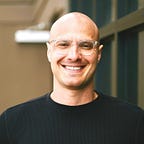Quality, Mastery, and Productive Activity
Three great minds and a philosophy of life worth considering.
Robert Pirsig, George Leonard, and Erich Fromm are three of my favorite thinkers. They each have had a vast influence on my life and work and represent an unfortunately rare compassionate masculinity. While they used different words and approached the topic from different angles, they were all interested in something similar.
Pirsig called it Quality. Leonard called it Mastery. Fromm called it Productive Activity.
Pirsig’s Quality occurs when an actor becomes so engaged in his or her act that there ceases to be a difference between the two — they became one. Leonard’s Mastery is a path; a lifelong practice of devotion to something or someone that yields unmatched fulfillment. Fromm’s Productive Activity is a process of using one’s full powers so that person and activity and result of activity are a single, continuous thread.
Unlike the more modern psychological concept of Flow, or a transient state of “being in the zone,” Quality, Mastery, and Productive Activity are enduring mindsets — underlying approaches to life that must be deliberately cultivated over time. They each result from deep caring and full engagement and point toward a way of living that is fulfilling, satisfying, and in harmony with the people and environment around you.
You’ve got to fully embrace what you’re doing — not every minute of it, but the totality of the journey — and you’ve got to be driven from within.
“Recognition is often unsatisfying and fame is like seawater for the thirsty. Love of your work, willingness to stay with it even in the absence of extrinsic reward, is good food and good drink.” — Leonard
“The purpose of abolishing grades and degrees is not to punish mules or get rid of them but to provide an environment in which that mule can turn into a free man…He’d no longer be a grade-motivated person. He’d be a knowledge motivated person. He would need no external pushing to learn. His push would come from the inside.” — Pirsig
Long-term meaning and fulfillment are often born out of struggle; but they beat short-term pleasure any day.
“Joy is what we experience in the process of growing nearer to the goal of becoming ourselves.” — Fromm
“For most people, the plateau can be a form of purgatory, flushing out hidden motivations…At the heart of it, mastery is a practice. Mastery is staying on the path.” — Leonard
True strength comes from humility and radical openness: Be caring, responsible, and respectful. Those who act toughest are often weakest.
“Caring, responsibility, respect, and knowledge are mutually interdependent. They are a syndrome of attitudes which are to be found in the mature person; that is, in the person who develops his own powers productively, who only wants to have what he has worked for, who has given up on narcissistic dreams of omniscience and omnipotence, who has acquired humility based on the inner-strength which only genuine Productive Activity can give.” — Fromm.
“The truth knocks on the door and you say, ‘Go away, I’m looking for the truth,’ and so it goes away.” — Pirsig
Cultivating a philosophy of life is a never-ending practice.
Pirsig’s Quality is about nurturing gumption, a persistent sticktoitiveness that withstands the resistance known as anxiety and ego. “I like the word gumption,” he writes, “because it’s so homely and so forlorn and so out of style it looks as if it needs a friend and isn’t likely to reject anyone who comes along. I also like it because it describes exactly what happens to someone who connects with Quality. He gets filled with gumption…A person filled with gumption doesn’t sit around dissipating and stewing about things. He’s at the front of the train of his own awareness, watching to see what’s up the track and meeting it when it comes. That’s gumption.”
Leonard’s Mastery involves a five-step plan:
- Seek instruction from those who are also on the path of mastery.
- Practice continuously.
- Surrender completely to your pursuit.
- Develop self-awareness and rely on intention to direct the journey.
- Don’t be scared to push on the razor’s edge.
Fromm’s Productive Activity is founded in four elements:
- Self-discipline.
- Concentration.
- Patience.
- Supreme concern.
Unfortunately, Quality, Mastery, and Productive Activity are antithetical to our current culture, which praises external results, prioritizes short-term gains over long-term growth, rewards the facade of toughness over humility, and pressures one toward conformity (think: corporate marketing) over individuality. Pursuing the path of Quality, Mastery, and Productive Activity is, then, by definition abnormal. But it’s so worth it.
Understand that there ARE others who are on this path: find and surround yourself with them. Though your journey will be unique, like-minded company and support makes for smoother sailing. Community is a powerful force.
Thanks for reading. If you found this interesting and want more, consider following me on Twitter @Bstulberg and checking out my new book, Peak Performance: Elevate Your Game, Avoid Burnout, and Thrive with the New Science of Success.
Brad Stulberg writes about health and the science of human performance. He is a columnist at New York Magazine and Outside Magazine.
